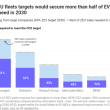Taiwan is targeting more than $1.5 billion in investment from insurance funds to support its transition to green energy, as part of its broader strategy to combat climate change and reduce carbon emissions, Environment Minister Peng Chi-ming has announced.
Despite many nations missing the United Nations deadline to submit updated climate targets, Taiwan is keen to demonstrate its commitment to global environmental responsibility. While it is not a member of the UN due to objections from China, which claims the island as its territory, Taiwan remains proactive in advancing its climate policies outside the Paris Agreement framework.
Last month, President Lai Ching-te unveiled a more ambitious carbon reduction goal, pledging to cut greenhouse gas emissions by 26% to 30% by 2030 compared to 2005 levels—an increase from the previous target of 23% to 25%.
Speaking to a media house, Peng highlighted the potential of Energy Service Companies (ESCOs), which design, construct, and finance energy-saving projects, as an attractive investment opportunity. The environment ministry, alongside the economy ministry and the Financial Supervisory Commission, has established a working group to channel insurance industry funds into ESCOs.
The initiative will begin with an initial investment of T$10 billion ($304.92 million), with plans to expand to T$50 billion ($1.52 billion) in a second phase. “ESCOs offer long-term, stable returns, making them a suitable investment for the insurance sector,” Peng said, though he did not specify a timeline for the funding rollout.
Taiwan is progressively phasing out coal-fired power plants while increasing its reliance on liquefied natural gas and investing heavily in solar and wind energy projects.
Peng emphasised that Taiwan, located in a subtropical zone, is increasingly vulnerable to extreme weather events, including severe heatwaves, stronger typhoons, and prolonged droughts. The island recorded its hottest year on record in 2024 and endured its worst drought in half a century in 2021, following a year without any typhoon landfall—a key source of water replenishment for its reservoirs.
“For nations at our latitude, drought poses a significant threat,” Peng warned. “While we currently have the resilience to manage these challenges, we cannot rule out the possibility of even more extreme conditions in the future.”

















